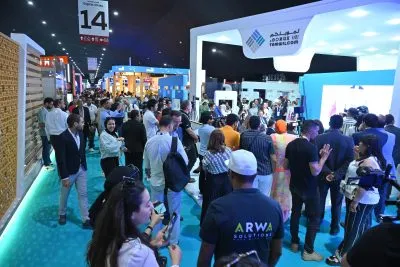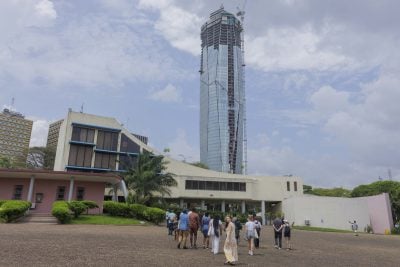In Singapore, trade enjoys a god-like status. It is venerated and pursued in all its diverse forms. If it were a person, it would be garlanded with flowers day and night. There is good reason for this – trade has showered wealth and prosperity on all who live on the island nation. It is indeed the God of Good Fortune and all its conditions must be met lest it gets into a sulk and moves to other regions.
The first condition for trade to exist is that there must be two or more parties, with items or services to exchange, involved. Suitable partners must be sought and found wherever they may exist in the world.
This essentially is the brief given to International Enterprise Singapore (IE Singapore in short). It is a government agency exclusively devoted to promoting external trade and investments. “We spearhead the overseas growth of Singapore-based companies and do whatever is possible to promote international trade,” says Rahul Ghosh, the divisional director of the Middle East and Africa Group.
‘Given Africa’s significant development needs, we see an opportunity to collaborate and develop long-term solutions in many areas’
The organisation is run like a corporation, under the Ministry of Trade, with a CEO (currently Teo Eng Cheong) at the top and several deputy CEOs overseeing a whole cluster of groups that focus either on markets (North and Latin America, South Asia, Middle East and Africa, etc) or sectors such as ‘Capability Development’ or ‘Lifestyle Business’ and so on.
It runs 35 overseas centres in both developed and emerging markets. The Middle East and Africa Group has seven centres, five in the Middle East and two in Africa – in Ghana and Johannesburg. There is talk of opening another centre in East Africa. The centres are run by well-drilled staff who know everything there is to know about rules and regulations, investment opportunities, local companies and pitfalls awaiting the unwary.
There is a two-way flow of information where others pick up the baton and engage with local companies in Singapore or encourage foreign companies, especially those dealing in global commodities, to relocate to Singapore. Olam was one such company that was enticed to set up its headquarters in Singapore.
Given the importance that Singapore places on consistently expanding trade and developing new markets, it is no wonder that IE Singapore is always on the lookout for the brightest graduates it can lay its hands on to join the organisation.
Results-oriented
As part of the preparation for this year’s Africa-Singapore Forum, which is principally organised by IE Singapore, the agency invited a handful of African journalists to visit the island on a familiarisation tour. I was once again taken aback at the youth and efficiency of the IE staff assigned to look after us, although it was a pleasure to renew acquaintances with the likes of Rahul Ghosh and Joanna Tan, whom I had met on earlier visits.
The impression I have gained after several meetings with IE Singapore staff is that behind the ready smiles and humorous quips, they are actually very competitive and protective about the regions they cover. They are a mine of information about their regions and can astound you with their detailed knowledge of places that you think you know well. They are also very results-oriented. I asked Rahul if the Africa-oriented Forums were meeting expectations.
“Since 2010 when we took our first stab at Africa, the outcome has been surprisingly very, very positive.” He added that by creating the Africa Business Group, some companies that had been doing very good business in Africa for a long time, such as Wilmar, Tolaram and Olam, were able to bring in the private sector perspective and that they had been of great help in making the Forums more effective. The focus of this year’s Forum, he told me, would be public-private partnerships.
There are over 60 Singaporean companies in Africa already and more are expected to join them. “Singapore companies are taking concrete steps to participate more actively in Africa’s growth,” says G. Jayakrishnan, Group Director for Middle East and Africa. “Given Africa’s significant development needs, we see an opportunity to collaborate and develop long-term solutions in many areas.”
Want to continue reading? Subscribe today.
You've read all your free articles for this month! Subscribe now to enjoy full access to our content.
Digital Monthly
£8.00 / month
Receive full unlimited access to our articles, opinions, podcasts and more.
Digital Yearly
£70.00 / year
Our best value offer - save £26 and gain access to all of our digital content for an entire year!
 Sign in with Google
Sign in with Google 


